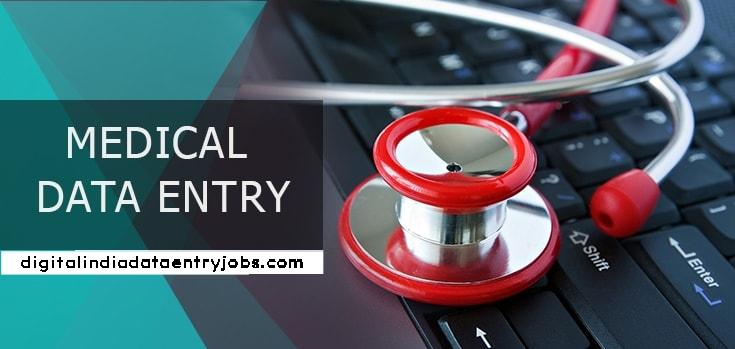Medical Data Entry Jobs:- Effective medical data entry enhances patient care, expedites medical processes, and produces better results.
Accurate and quick data entry enables healthcare providers to make well-informed decisions and deliver individualized medicines.
This essay looks at the importance of entering medical data, the challenges with the current process, and how modern technology—like artificial intelligence—can boost output.
It features case studies of successful implementations together with discussions and predictions of interoperability and data sharing.
Contents
What is Medical Data Entry?
Entering patient-related data, such as medical history, diagnostic results, treatment plans, and other relevant information, onto digital systems like Electronic Health Records (EHRs) is known as medical data input.
Accurate and timely data entry is crucial for healthcare professionals to provide effective patient care, make informed decisions, and streamline healthcare operations.

Also Read:- Data Entry Work from Home, Onlinereferjobs, indnewsupdates.com
The Role of Medical Data Entry Jobs in Healthcare?
In the healthcare sector, medical data entry professions have a significant and diverse role that impacts many aspects of patient care, decision-making, and healthcare administration.
The following are important positions in medical data entry:
1. Patient Care
Patient care, which encompasses all aspects of providing individuals with medical attention and support, is the main objective of healthcare. Promote recovery and well-being, entails assessing patients’ health, developing treatment plans, diagnosing conditions, and giving remedies.
In order to improve overall health outcomes and the patient experience, good patient care must include empathy, compassion, and individualized attention.
Healthcare practitioners collaborate across disciplines to provide complete treatment, taking into account the patient’s emotional, psychological, and social needs in addition to their medical needs.
2. Decision-Making
In the healthcare sector, selecting the optimum course of action for patient care and management is an essential component of decision-making.
Healthcare providers use medical data input services to evaluate patients’ conditions, make diagnoses, and choose the best course of therapy.
When making decisions that will improve patient outcomes, effective decision-making takes potential risks, rewards, and patient preferences into account.
It involves interdisciplinary collaboration, continuous outcome assessment, and a commitment to deliver safe, ethical, and patient-centered care in a dynamic, ever-evolving medical setting.
3. Continuity of Care
In the healthcare business, continuity of care refers to the orderly and smooth provision of medical services to patients as they travel between several institutions or interact with a variety of healthcare professionals.
Maintaining open channels of communication, sharing medical records, and getting a complete understanding of patients’ medical histories and ongoing treatment plans are all necessary.
By providing consistent and unbroken care, continuity of care lowers the chance of medical errors, boosts patient satisfaction, and promotes better health outcomes. It also fosters a holistic approach to patient management.
4. Research and Analysis
Research and analysis in healthcare involve methodical exploration and examination of medical data, treatments, and outcomes to improve patient care and expand scientific understanding.
Scholars utilize several methodologies to examine trends in illness, results of treatment, and medical procedures. Data analysis shows trends, linkages, and potential areas for bettering healthcare delivery.
The results of evidence-based research play a critical role in developing best practices and recommendations for medicine, expanding the field of medicine, and ultimately raising patient outcomes and healthcare standards.
Also Read:- What is Data Entry, Mobilenumbertrackeronline, Nebsit Council

5. Healthcare Efficiency
Providing prompt, economical, high-quality patient care requires optimizing healthcare systems and staff. This is known as healthcare efficiency. It means cutting down on needless delays, optimizing workflows, and simplifying administrative expenses.
Efficient healthcare systems prioritize technology, standardized procedures, and interdisciplinary collaboration to enhance provider coordination and communication.
By eliminating inefficiencies and boosting productivity, healthcare business process outsourcing seeks to optimize the value of healthcare services, improve patient satisfaction, and provide the best possible health outcomes for individuals and populations.
6. Billing and Reimbursement
In the healthcare sector, billing and reimbursement handle the financial elements of medical services. Healthcare providers precisely record the services rendered and related costs on their precise bills.
After that, patients or insurance companies receive these bills for payment. Part of the reimbursement process involves getting money from patients or insurance companies to cover medical expenses.
Appropriate billing and reimbursement practices are essential for healthcare organizations to be financially sustainable, enable fair compensation for services rendered, and preserve openness in healthcare financial transactions, all of which are advantageous to patients and providers.
Benefits of Medical Data Entry Jobs
By outsourcing data entry services, medical practitioners can make better use of their time and become more productive overall. Additionally, selecting the best medical transcription service provider can boost healthcare facilities’ overall profitability. Other advantages of outsourcing include:
- Prevent Data faults: By establishing a standardized procedure and maintaining checkpoints at each level of data entry, outsourcing to qualified specialists helps to prevent data faults.
- Significant Cost Savings: Compared to in-house processing, outsourcing hospital back-office data input entails much lower costs. You save a lot of money as a result of this.
- Savings on Rent/Real Estate: Because the offshore team is situated right at the source, you avoid paying extra for space, rent, or real estate that would be required if the job were done by employees of the company.
- Centralized Information Flow: By contracting with offshore service providers to handle medical data input, you can take advantage of centralized information flow.

Conclusion
Simplifying medical data entry improves patient care standards and streamlines healthcare procedures. Artificial intelligence (AI) and interoperable systems provide promising solutions to the issues of the modern world.
By improving accuracy, decision-making, and research skills, optimized data entry contributes to the development of a more effective and patient-centered healthcare system, opening the door to improved results and a more promising future for healthcare management.
Also Read:- Data Entry Clerk, Companycontactdetail, Uidaionlineaadharcard
FAQs On Medical Data Entry Jobs
Q.) What function do data entry services serve in medical facilities?
Ans. For the smooth operation of processes and future use, virtual data entry services assist hospitals in updating their patient records, patient profiles, hospital records, medical claims, medical bills and transcriptions, medical scans and reports, and financial and accounting information methodically.
Q.) What function do data scrubbing and cleansing services serve in hospitals?
Ans. Hospitals and healthcare service providers can improve and standardize their data by using data cleansing and scrubbing services to help with the processes. This involves enhancing and correcting data that is missing or misplaced, inaccurate or duplicated, inconsistent with feedback, and incomplete.
Q.) What are the ways that medical data entry services may help the healthcare industry?
Ans. Hospitals and the healthcare industry can receive high-quality services with less paperwork when they use data entry services. In addition to improved data security, long-term data storage and retrieval are possible. Additionally, this boosts output, reduces the possibility of mistakes, and enables hospitals to provide services quickly and efficiently.
#Saras

